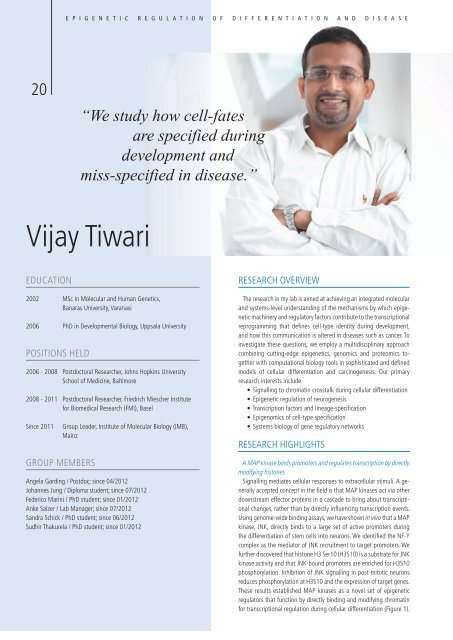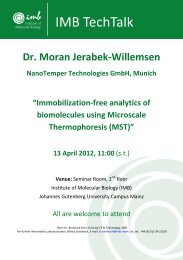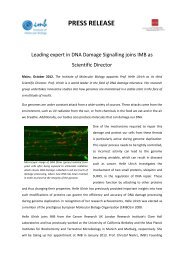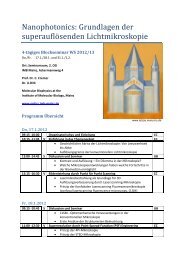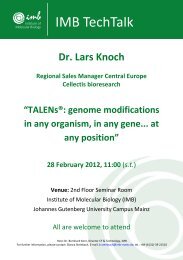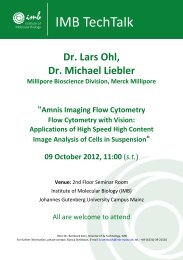Low-resolution PDF - IMB
Low-resolution PDF - IMB
Low-resolution PDF - IMB
You also want an ePaper? Increase the reach of your titles
YUMPU automatically turns print PDFs into web optimized ePapers that Google loves.
E p i g e n e t i c R e g u l a t i o n o f D i f f e r e n t i a t i o n a n d D i s e a s e<br />
20<br />
“We study how cell-fates<br />
are specified during<br />
development and<br />
miss-specified in disease.”<br />
Vijay Tiwari<br />
Education<br />
2002 MSc in Molecular and Human Genetics,<br />
Banaras University, Varanasi<br />
2006 PhD in Developmental Biology, Uppsala University<br />
Positions held<br />
2006 - 2008 Postdoctoral Researcher, Johns Hopkins University<br />
School of Medicine, Baltimore<br />
2008 - 2011 Postdoctoral Researcher, Friedrich Miescher Institute<br />
for Biomedical Research (FMI), Basel<br />
Since 2011<br />
Group Members<br />
Group Leader, Institute of Molecular Biology (<strong>IMB</strong>),<br />
Mainz<br />
Angela Garding / Postdoc; since 04/2012<br />
Johannes Jung / Diploma student; since 07/2012<br />
Federico Marini / PhD student; since 01/2012<br />
Anke Salzer / Lab Manager; since 07/2012<br />
Sandra Schick / PhD student; since 06/2012<br />
Sudhir Thakurela / PhD student; since 01/2012<br />
Research Overview<br />
The research in my lab is aimed at achieving an integrated molecular<br />
and systems-level understanding of the mechanisms by which epigenetic<br />
machinery and regulatory factors contribute to the transcriptional<br />
reprogramming that defines cell-type identity during development,<br />
and how this communication is altered in diseases such as cancer. To<br />
investigate these questions, we employ a multidisciplinary approach<br />
combining cutting-edge epigenetics, genomics and proteomics together<br />
with computational biology tools in sophisticated and defined<br />
models of cellular differentiation and carcinogenesis. Our primary<br />
research interests include:<br />
• Signalling to chromatin crosstalk during cellular differentiation<br />
• Epigenetic regulation of neurogenesis<br />
• Transcription factors and lineage-specification<br />
• Epigenomics of cell-type specification<br />
• Systems biology of gene regulatory networks<br />
Research Highlights<br />
A MAP kinase binds promoters and regulates transcription by directly<br />
modifying histones<br />
Signalling mediates cellular responses to extracellular stimuli. A generally<br />
accepted concept in the field is that MAP kinases act via other<br />
downstream effector proteins in a cascade to bring about transcriptional<br />
changes, rather than by directly influencing transcription events.<br />
Using genome-wide binding assays, we have shown in vivo that a MAP<br />
kinase, JNK, directly binds to a large set of active promoters during<br />
the differentiation of stem cells into neurons. We identified the NF-Y<br />
complex as the mediator of JNK recruitment to target promoters. We<br />
further discovered that histone H3 Ser10 (H3S10) is a substrate for JNK<br />
kinase activity and that JNK-bound promoters are enriched for H3S10<br />
phosphorylation. Inhibition of JNK signalling in post-mitotic neurons<br />
reduces phosphorylation at H3S10 and the expression of target genes.<br />
These results established MAP kinases as a novel set of epigenetic<br />
regulators that function by directly binding and modifying chromatin<br />
for transcriptional regulation during cellular differentiation (Figure 1).


